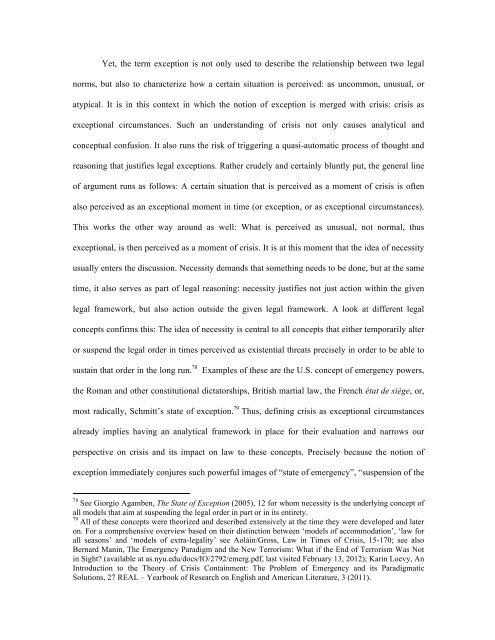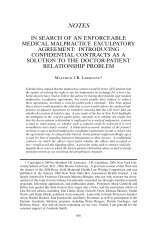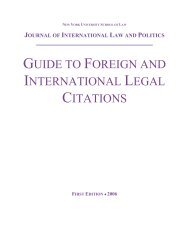Jasper Finke, Crisis and Law - New York University School of Law
Jasper Finke, Crisis and Law - New York University School of Law
Jasper Finke, Crisis and Law - New York University School of Law
You also want an ePaper? Increase the reach of your titles
YUMPU automatically turns print PDFs into web optimized ePapers that Google loves.
Yet, the term exception is not only used to describe the relationship between two legal<br />
norms, but also to characterize how a certain situation is perceived: as uncommon, unusual, or<br />
atypical. It is in this context in which the notion <strong>of</strong> exception is merged with crisis: crisis as<br />
exceptional circumstances. Such an underst<strong>and</strong>ing <strong>of</strong> crisis not only causes analytical <strong>and</strong><br />
conceptual confusion. It also runs the risk <strong>of</strong> triggering a quasi-automatic process <strong>of</strong> thought <strong>and</strong><br />
reasoning that justifies legal exceptions. Rather crudely <strong>and</strong> certainly bluntly put, the general line<br />
<strong>of</strong> argument runs as follows: A certain situation that is perceived as a moment <strong>of</strong> crisis is <strong>of</strong>ten<br />
also perceived as an exceptional moment in time (or exception, or as exceptional circumstances).<br />
This works the other way around as well: What is perceived as unusual, not normal, thus<br />
exceptional, is then perceived as a moment <strong>of</strong> crisis. It is at this moment that the idea <strong>of</strong> necessity<br />
usually enters the discussion. Necessity dem<strong>and</strong>s that something needs to be done, but at the same<br />
time, it also serves as part <strong>of</strong> legal reasoning: necessity justifies not just action within the given<br />
legal framework, but also action outside the given legal framework. A look at different legal<br />
concepts confirms this: The idea <strong>of</strong> necessity is central to all concepts that either temporarily alter<br />
or suspend the legal order in times perceived as existential threats precisely in order to be able to<br />
sustain that order in the long run. 78 Examples <strong>of</strong> these are the U.S. concept <strong>of</strong> emergency powers,<br />
the Roman <strong>and</strong> other constitutional dictatorships, British martial law, the French état de siège, or,<br />
most radically, Schmitt’s state <strong>of</strong> exception. 79 Thus, defining crisis as exceptional circumstances<br />
already implies having an analytical framework in place for their evaluation <strong>and</strong> narrows our<br />
perspective on crisis <strong>and</strong> its impact on law to these concepts. Precisely because the notion <strong>of</strong><br />
exception immediately conjures such powerful images <strong>of</strong> “state <strong>of</strong> emergency”, “suspension <strong>of</strong> the<br />
78 See Giorgio Agamben, The State <strong>of</strong> Exception (2005), 12 for whom necessity is the underlying concept <strong>of</strong><br />
all models that aim at suspending the legal order in part or in its entirety.<br />
79 All <strong>of</strong> these concepts were theorized <strong>and</strong> described extensively at the time they were developed <strong>and</strong> later<br />
on. For a comprehensive overview based on their distinction between ‘models <strong>of</strong> accommodation’, ‘law for<br />
all seasons’ <strong>and</strong> ‘models <strong>of</strong> extra-legality’ see Aoláin/Gross, <strong>Law</strong> in Times <strong>of</strong> <strong>Crisis</strong>, 15-170; see also<br />
Bernard Manin, The Emergency Paradigm <strong>and</strong> the <strong>New</strong> Terrorism: What if the End <strong>of</strong> Terrorism Was Not<br />
in Sight? (available at as.nyu.edu/docs/IO/2792/emerg.pdf, last visited February 13, 2012); Karin Loevy, An<br />
Introduction to the Theory <strong>of</strong> <strong>Crisis</strong> Containment: The Problem <strong>of</strong> Emergency <strong>and</strong> its Paradigmatic<br />
Solutions, 27 REAL – Yearbook <strong>of</strong> Research on English <strong>and</strong> American Literature, 3 (2011).
















